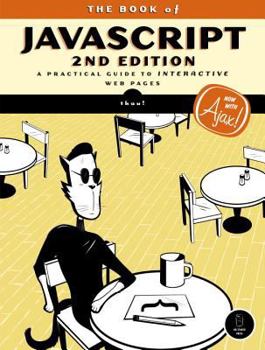The Book of Javascript, 2nd Edition: A Practical Guide to Interactive Web Pages
Select Format
Select Condition 
Book Overview
Customer Reviews
Rated 5 starsImplementation details
When I had to create my first data model for an entire system, I instructed myself with this book and "Data Modeling For Information Professionals" by Bob Schmidt. Schmidt's book provided the theory, and this book provided the implementation rules and guidelines. I think the attribute rules probably helped me the most. The hierarchy rules, which were written in a way that I could relate to from an object-oriented perspective,...
0Report
Rated 5 starsExcellent book!
This book is excellent. The subject matter is advanced but still easy to read and understand. The examples used in the book are varied and excellent illustrations of the problems discussed in the book. Many of the examples remind me of similar data modeling errors I have seen in my experience and give excellent methods of correcting the mistakes. I highly reccomend this book for the data modeler who is ready to go to the...
0Report
Rated 5 starsEasy to understand
I have many books on data modeling but this one is probably the most understandable. The examples are well-formed and many diagrams are provided along with written explanations. They do an excellent job of going through 5th normal form and show how to resolve many different issues such as special cases in generalization hierarchies. I have found this book very useful in practice and it has served me well.
0Report
Rated 5 starsExcellent resource for any data modeller
This book is really a "no-nonsense guide" for data modeller. However the diagram conventions are significantly different than found on some of the popular CASE tools. But overall I keep refering to this book.
0Report
Rated 5 starsImproving your Models
This book is not a database book, nor does it try to be that. For anyone who understands the role of logical data modelling, this book will prove to be a valuable addition to your professional bookshelf. It is filled with detailed examples of good & bad models, along with analyses that list the pros & cons of each approach. I'd recommend this to any intelligent professional who is moving into the data architect role,...
0Report












